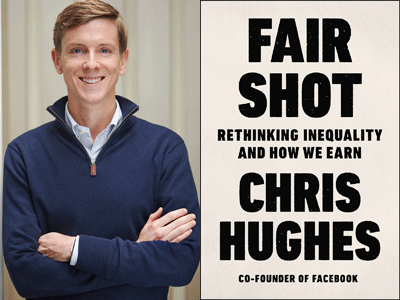I think this book is a very honest attempt to explain why guaranteed income is
needed specially now.
Some of the reasons why it
is in the news is because of the looming threat of Artificial Intelligence
which
is going to change the
nature of economy but keeping that aside there are strong enough reasons to
consider it. Even though employment numbers tell a different story (less
unemployment) - the number of people living
paycheck to paycheck, doing more than one job with no benefits - has increased.
The benchmark of “employment numbers” no longer fully reflects the reality.
The author Chris Hughes’
Facebook co-founder has been humble enough to admit that “he got lucky”. His
working class parents did just enough to provide him with opportunities
(education) and he ended up at Harvard where he happened to choose Mark
Zuckerberg as his roommate - what if he hadn’t?. It then turned out that they
created Facebook and he ended up with half-a-billion dollars even before he had
turned 30.
From his life story you get
that working class vibe which is totally true.
He seems to have done a lot
of introspection how he ended up in the 1% of the population and so young and
it seems to have had a profound effect on him.
He makes a very passionate
case for Guaranteed Income.
Everyone seems to have
their own definition/interpretation of Guaranteed Income. It is sometimes
called as Universal Basic Income i.e for all the people. I was a little
surprised by his manifest for Guaranteed Income (note - he doesn’t call it UBI)
but he does make a strong case for it with solid numbers and study as evidence.
He calls for every working age adult making less than $50,000 a year to be
given a $500 month which would be paid for by the top 1% - total budget
for it would be $290 billion i.e less than half of the US defense budget or the
Social Security system. In Chapter-9 he also points out that there are some
ridiculous tax loopholes which if plugged can provide funding for such a system.
Like, Warren Buffett pays less tax than his assistant cause if you earn more
than $250,000 a year - your capital gains tax rate is less and if you inherit
some property or a mansion - you do not pay tax on it. Popular loophole for the
ultra-rich.
This gives a very
reasonable estimate for the programme and also answers a popular criticism of
who’s going to fund it.
Also, there’s a common
tendency to label the recipients of such a benefit as lazy or few other
derogatory terms - but I find it appalling and the author also points out that
such efforts in the past have been invasive - asking extremely personal and
uncomfortable questions to females.
A relevant reading would be
“Regulating the poor”.
I also got the sense in
Chapter-8 about how extremely difficult it is to get such a bill (or as a
matter of fact any bill) passed in both the Houses. Everyone has their own
views, understanding of the subject and are eager to leave their own stamp on
the bill - which leads to concessions, negotiations, stalemates and a few times
it all works out.
I was a bit confused about
why guaranteed income implementation is needed when there’s an Income Tax
credit (EITC). There’s a chapter about it but I’m not fully clear yet.
I don’t say it often but
this book has a very sincere moving “Afterword”!
To summarize I agree that The
natural drift of capitalism toward inequality requires a constant vigilance to
make the market for everyone, not just for the rich. And such a system is
needed.
P.S -
It was remarkable to note
that MLK was in favor of such an idea but was assassinated before he could
start a movement for it. Alaska already has a similar prototype, Permanent Fund
out of which all Alaskans are on an average paid $1400 a year and it has
relatively less inequality.
Links - Stockton
California,
